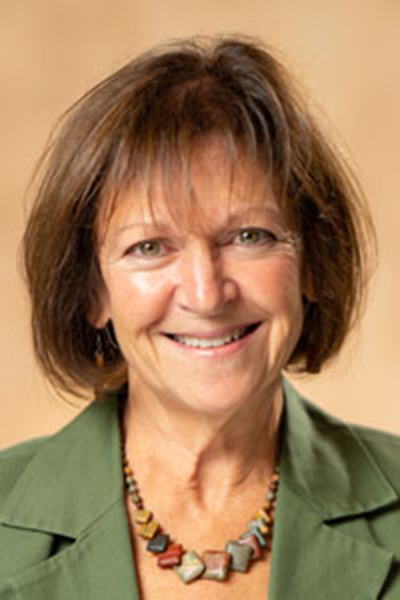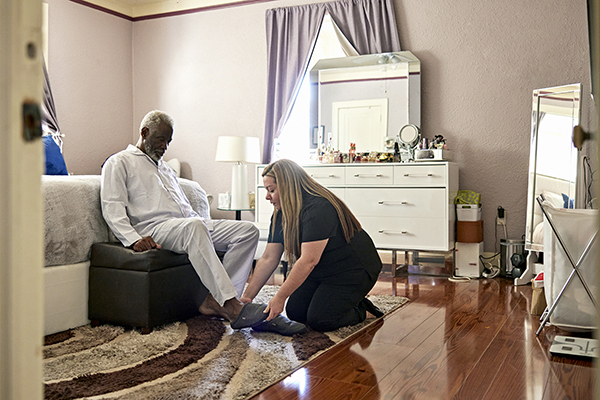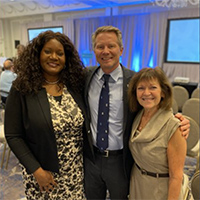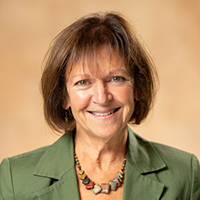by Matthew Smith
It is no surprise that the population is aging, but what few realize is that within the next decade, the number of older adults will exceed the number of children.
This shift means that families will increasingly need help to provide care for their older relatives, especially those living with Alzheimer’s disease and related dementias.
Unfortunately, there are already too few people in the workforce caring for people with dementia, and the services they provide are not always optimal.
A national study funded by an $81 million grant from the National Institute on Aging will learn more about this very workforce, and the University of North Carolina at Chapel Hill is in a prime position to assist with the study.

School of Social Work Associate Dean for Research and Faculty Development Sheryl Zimmerman is taking the lead on developing the component of a national multi-part survey that will improve understanding of the strengths, challenges and gaps of the dementia workforce in assisted living. Other parts of the survey will focus on nursing homes, hospitals, clinics and care provided in private homes.
“We well know that the number of people with Alzheimer’s and other dementia-related illnesses continues to grow,” Zimmerman said. “There will be almost 14 million people facing dementia-related diseases by 2060 and we already have an insufficient workforce to cover that number. Assisted living is the largest provider of residential long-term care for persons living with dementia, so understanding their workforce is especially critical.
“I do research in assisted living and talk with their staff regularly. At least once a week I’ll talk to someone who tells me they just don’t have time to talk, and sometimes, ‘I’m sorry; I’m too busy to talk because I’m the only one here today.’ There are not enough people — that’s the challenge.”
National experts
The study, led by the University of Michigan and the University of California, San Francisco, will develop four surveys to produce data for clinicians, researchers and policymakers. Those surveys will focus on multiple aspects of the dementia care workforce including the structure of care teams, wages and compensation, processes and practices, education and training, occupational safety, and use of community services.
Zimmerman has spent decades partnering with assisted living providers, policy makers and other researchers through her research base in the UNC Cecil G. Sheps Center for Health Services Research. Earlier this year she became executive director of the national Center for Excellence in Assisted Living (CEAL@UNC).
The study team is relying on Zimmerman to serve as an expert and lead the development of the assisted living portion of the survey.
“Through more than two decades of research, we’ve become recognized as the national experts in assisted living research,” she said. “That’s our bread and butter. Our role in this project will not only be to inform the other three surveys, but to take a leadership position on the assisted living survey.”
Zimmerman said the need for the study comes from the lack of comprehensive information about this specific population.
“The study will be the first ever looking at the dementia care workforce at large,” she said. “It involves everyone from clinicians, staff at assisted living communities and nursing homes, and those who come into people’s homes. They will all be included in our data collection efforts.”
The inclusion of direct care workers is important because they are often overlooked despite playing a crucial role in care.
“Including direct care workers in private homes, assisted living and nursing homes is vital because they provide most of the support people living with dementia receive,” Zimmerman said. “It was the workforce that was decimated during the pandemic. It’s an underpaid workforce and an undertrained workforce, but a critical workforce. Recognizing its importance as part of this study is critical.”
Improving policy
The surveys will be administered annually for the next five years. The research team will also build a secure data infrastructure that makes it possible for other researchers and collaborators to access the data for their own use.
That may lead to better industry practices, standards and federal and state policies.

“It’s all about improving practice and policy,” Zimmerman said. “The scope of these data is going to allow us to understand things we couldn’t before about the workforce, and highlight strengths and challenges that we didn’t previously understand, including about the overall health care system.
“Overall, we aim to improve the lives of people living with dementia and of the dementia care workforce,” she said. “We expect to find areas of strength, areas where there is room to improve, and then ultimately determine ways that we can fill those gaps to improve the workforce and the people we’re serving.”
UNC and CEAL@UNC expect to play a key role after the data are collected, Zimmerman said.
“CEAL@UNC is committed to creating new strategies and initiatives around assisted living care,” Zimmerman said. “Although based here in North Carolina, CEAL@UNC is a national center, so the practice and policy changes that could come from the grant can have widespread effect.
“Also, I expect we’ll find more opportunities for social workers to play key roles in dementia care,” she said. “Having more information about specific areas of need can translate to our educational efforts. Those connections are something that the School and UNC are incredibly good at. It’s all about connecting our research, teaching and service.”
Zimmerman stresses that the research that will be done using the survey data is the most exciting aspect of the grant.
“It’s not just about collecting data,” she said. “Researchers will be able to apply for funding opportunities to use the data. They’ll study important research questions aiming to strengthen the workforce and improve care and outcomes for people living with dementia.”
With administrative partners like U-M, UCSF, the University of Pennsylvania, Brown University and Yale University, Zimmerman is looking forward to the breakthroughs the project will produce.
“The leadership and collegiality of bringing together and networking with such a rich group of researchers across so many different areas takes strong leadership and expertise,” Zimmerman said. “It’s not every day that someone brings a group of institutions like this together.”
University of Michigan researcher Donovan Maust, who will lead the grant team, said its efforts are much needed.
“We can’t overstate the urgency of gathering this information and harnessing it in ways that can help the 6 million Americans already living with dementia, and the millions more who will be diagnosed in years to come as new tests and treatments for early-stage dementia become available,” Maust said in a university release. “Finding, training and keeping workers is a key challenge for all parts of the health care industry right now, and we hope to make it possible to find and address causes of burnout and quitting, including through federal workforce-related funding.”
Learn more about the grant from the University of Michigan’s Institute for Healthcare Policy and Innovation.
Related stories

SSW becomes new home for CEAL@UNC
The national Center for Excellence in Assisted Living is expanding its work to advance the well-being of people who live and work in assisted living as the center becomes CEAL@UNC.

Zimmerman joins Dream Foundation board
Sheryl Zimmerman joined the National Board of Directors for Dream Foundation, the only national dream-granting organization for terminally-ill adults.

